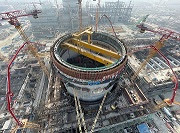Over Zoom, Zelensky requested additional airplanes, a stoppage of oil purchases from Russia and the establishment of a no-fly zone over Ukrainian airspace.
Both Democrats and Republicans lauded Zelensky after their virtual meeting and pledged to do what they could to assist Ukraine.
“Honored to hear from @ZelenskyyUa as he takes every measure to defend Ukraine from illegal Russian aggression and Putin’s indiscriminate attacks on civilians. Zelenskyy’s resilience and commitment to the people of Ukraine inspire the world. Proud to stand with you Mr. President,” the Senate Foreign Relations Committee tweeted.
Sen. Ben Sasse, who sits on the Senate Intelligence Committee, confirmed in a statement that Zelensky had asked for either a no-fly zone over Ukrainian airspace or planes for Ukraine.
“Ukraine needs airpower urgently and America should send it. Zelensky’s message is simple, ‘close the skies or give us planes.’ Let’s be clear-eyed about our options, a no-fly zone means sending American pilots into combat against Russian jets and air defenses — in a battle between nuclear powers that could spiral out of control quickly,” Sasse said.
“But Americans should absolutely send Ukrainians planes, helicopters, and UAVs. Let’s resupply Ukraine’s Air Force today and keep the Ghosts of Kyiv in the skies.”
A no-fly zone is instituted to stop nations from carrying out attacks over groups of people or flying in certain areas.
The Biden administration balked at declaring a no-fly zone over Ukraine, arguing that the move could easily escalate the Russia-Ukraine conflict into a wider war.
Senate Majority Leader Charles Schumer also voiced support to supply Ukraine with planes.
“President Zelenskyy made a desperate plea for Eastern European countries to provide Russian-made planes to Ukraine. These planes are very much needed. And I will do all I can to help the administration to facilitate their transfer,” he said in a statement.
Several senators also noted Zelensky asked for the United States to stop Russian oil and gas imports to further cripple the country's economy. Russia accounts for 10% of the crude oil global supply, the third-largest producer after the United States and Saudi Arabia.
“President @ZelenskyyUa said stopping the purchase of Russian oil and gas around the world would be one of the most powerful sanctions possible, ‘even more powerful than SWIFT,’ ” Sen. Dan Sullivan tweeted.
“.@POTUS, enough is enough. Listen to this brave President and a growing bipartisan group of senators. Block imports of Russian oil and gas TODAY, and produce more oil and gas from America. #StandWithUkraine #BanRussianImports,” he added.
Sen. Chris Coons, chair of the Senate Appropriations Subcommittee on State and Foreign Operations, called on Congress to pass millions of dollars in humanitarian and economic aid for NATO and Ukraine.
Zelensky underscored the urgent need for more military support and humanitarian aid from his Western partners, Coons said in a statement.
“This call to action must lead to swift passage by Congress of the US$10 billion in emergency supplemental aid that I have been calling for to give Ukraine and our NATO allies additional military, economic and humanitarian aid to respond to increasingly brutal Russian attacks on civilians and the rapidly growing humanitarian crisis in Eastern Europe,” he continued.
The call with the US lawmakers comes over a week after Russia invaded Ukraine. Ukrainian forces have fought fiercely against the Russian military, slowing its efforts to capture the country's major cities.
Sen. Lindsey Graham said that Zelensky had detailed “numerous examples of war crimes” committed in Ukraine.
“There were numerous examples of war crimes provided by President Zelensky - mayors have been captured, imprisoned and murdered. There are wholesale attacks on civilian targets, random, indiscriminate, and the Putin war machine, in my view, is in full blown war crimes mode,” Graham said in a video message posted on Twitter after the call.
“President indicated that labeling Putin a war criminal is the right thing to do, and he thinks would help tremendously.”
The remarks come as roughly 1.3 million people have fled Ukraine since February 24, according to data from the United Nations refugee agency. The conflict has sparked some leaders to consider waiving travel requirements in order to handle the serious humanitarian crisis.






